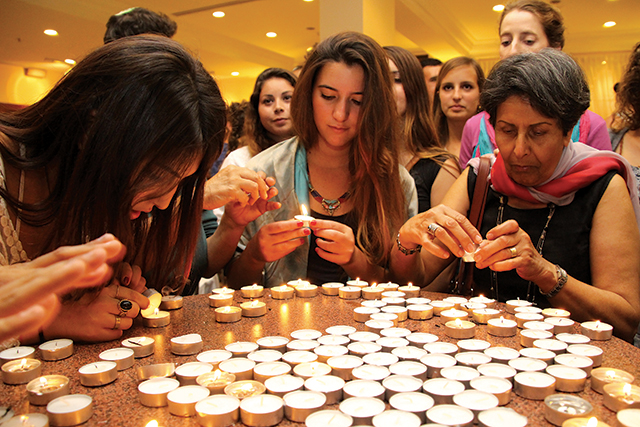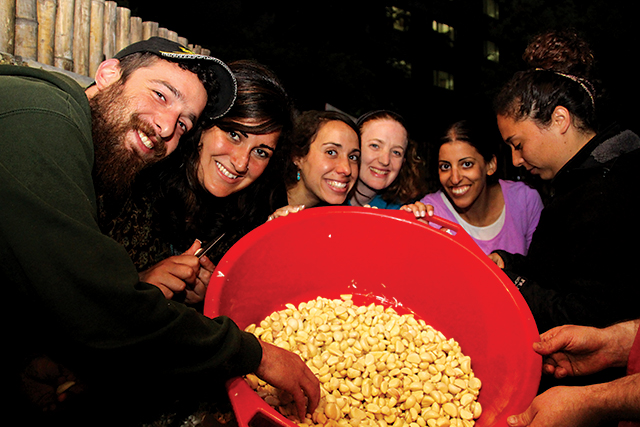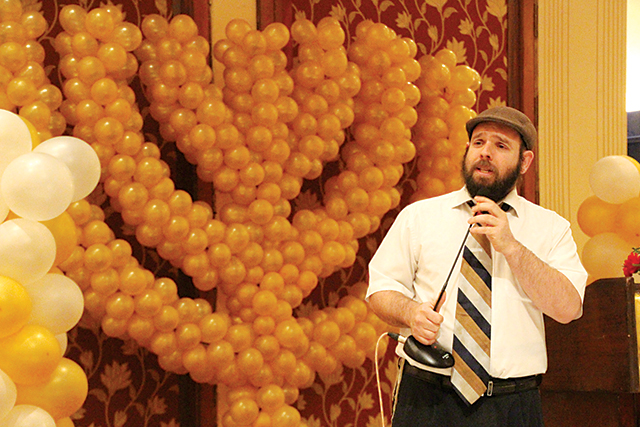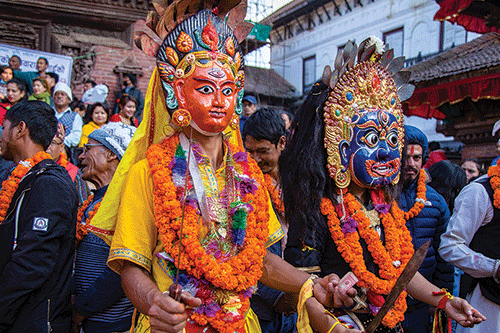For Israeli and Jewish travelers in Nepal, Kathmandu’s Chabad House is a home away from home.

As Nepal prepares to celebrate the annual Dashain festival, a small, but noticeable, group of people will be celebrating another important religious holiday: the Jewish holidays of Rosh Hashanah and Yom Kippur. Like Dashain, these holidays which make up the Jewish New Year, are among the most important to Jewish people worldwide. Hundreds of Jews – possibly thousands – will be observing these important dates in cities around Nepal, from 24 September to 4 October.
A common center point for Israelis and Jews visiting Nepal is the Chabad House, or “Beit Chabad” in Hebrew. The main Chabad House is in Thamel, with additional locations opening up in Manang and Pokhara for important Jewish holidays throughout the year. For Israelis and Jewish people, Chabad House is all at once a house, a community center, a restaurant, a synagogue, and a gathering place. Additionally, because the conservative practice of Judaism requires that certain dietary rules be followed, the restaurant provides a place for religious travelers to be able to eat according to their religious principles – something not commonly found in Kathmandu, or most places outside of Israel.
Chabad House is run by Rabbi Chezki Lifshitz and his wife, Chani. They have lived in Nepal for around 14 years and are raising their five children – four of whom were born in Nepal – in Kathmandu. They are serving as “shluchim,” or emissaries of Chabad, a worldwide organization whose mission is to assist Jewish communities worldwide. Although Chabad followers themselves are very religious or Orthodox Jews, Chabad House is a place for all Israelis and Jews, religious and non-religious alike.

“As Jewish people, we believe that we are a very big family, we are like sisters and brothers,” says Chani. “So, in every place where there is a Chabad House, you have family. You have a house and people who wait on you and give you food and smiles.”
The sense of community is heightened during Jewish holidays. Visitors participate in the preparation and organization of festivals, from peeling and slicing vegetables to preparing challah (traditional Jewish egg bread that is braided before baking) and desserts. Ahead of Passover this year, people stayed up all night to prepare the meal that would feed some 1,500 visitors – the largest Passover in the world.
The 2014 Passover holiday was particularly meaningful because it almost didn’t happen. Supply ships carrying goods specifically designed to meet Passover Kosher requirements were halted at ports in India due to a labor strike in Israel, in which the Israeli Embassy in Nepal participated – a challenge that Chabad met with humor and a can-do attitude.
“This year will be very special,” said Mendi Frankel ahead of the holiday. Frankel led the Passover services and dinner at the Chabad location in Pokhara. “Every year for Passover we get [special Kosher-for-Passover] plates from Israel, but since the container hasn’t come, we bought glass plates, metal spoons. It will be very fancy!”
As it turns out, they needn’t have worried – all the items, including tableware, prayer books, and food – arrived just in the nick of time, and the celebrations went off without a hitch.
The celebration in Manang was also a special one. “For the first time, we carried a Torah scroll up to Manang, 3500 meters high in the Annapurnas,” said Alexander Mark Rose, a Jewish man from Wales who volunteers for Chabad in Nepal. “It was one of the most incredible experiences in my life, to have Seder surrounded by snow-covered mountains. It was just beautiful.”

Statistics are hard to find, but according to the Israeli Embassy, roughly 8,000 Israelis visit Nepal every year. Rabbi Lifshitz estimates that Chabad gets around 10,000 visitors each year. Many of these are young backpackers who have recently finished their compulsory service in the Israeli army (with some exemptions for the very religious, all Israeli men serve for 3 years, women for 2, starting at age 18), and are looking to travel.
“A lot of the backpackers just finished their army service, and they don’t have a lot of money,” said Rose. “They try to travel to places that are very different from Israel, but which they can also afford. Being in Nepal exposes them to some very different cultures, and it’s a much less structured environment than the army.”
Israeli travelers in Nepal are also well-served outside of the Chabad House. Several hotels and restaurants – and even a couple of travel agencies – cater to Israeli customers, and the Israeli Embassy is active in promoting Israeli-Nepal relations. Just this year, the Embassy has donated solar panels to a local school and hospital, and the 9th Annual Israeli film festival was held in June in Kathmandu and Pokhara.
Some Israelis have liked Nepal so much that they have decided to stay indefinitely, and be a part of the community. Two of Kathmandu’s more popular tourist restaurants – OR2K and Friends – are owned by an Israeli man who has been here for around 15 years, and his cousin, an Israeli who originally came to Nepal as a tourist, has recently joined him in the family business.
“In Israel, everything is pressure, stress,” says Oded Becker, who manages Friends restaurant on Mandala Street in Thamel. “Here, everything is so relaxed, and when you meet Israelis here, they are more relaxed too.”
When it comes to Israelis connecting with each other in Nepal, Becker says that “because we are a small country, wherever we are in the world we find each other. When we are outside of Israel, we trust each other more, we understand each other better. I’ve made some of my best Israeli friends here in Nepal.”
Israel is such a small country – with a population of around 8.1 million people, 75 percent of whom are Jewish – that Israelis often say that there are only “three points of contact” between all Israelis. In other words, it takes only three questions to find someone they have in common: What city are you from? What university did you go to? Where did you serve for the army?
“If you ask me, it’s less than 3 questions,” says Tal Orly, an Israeli traveler who visited Nepal for around 6 weeks. “But it’s not really necessary to find people we have in common. As long as we have something in common here, we will get along.”
Chabad House is often the focal point where these connections are made. At least five marriages have resulted from people who did not know each other in Israel meeting at Chabad in Nepal. And if the prospect of meeting one’s future spouse isn’t enough, many Israelis are also often eager to meet the real-life couple behind the TV show “Kathmandu,” a popular Israeli TV show that dramatized the Lifshitz’s experience in coming to Nepal and setting up Chabad House, struggling to make their way in a completely different place.
Despite initial challenges, the couple has found it relatively easy to be a religious Jewish family in Nepal, even though Jews are so small a religious minority in Nepal they are not included in any official census numbers.
“There are some very religious Nepali people here, and they can understand when I mark all the Jewish holidays and festivals,” said Chani. “It’s like when I say to Nepali people that I cannot touch money on [the weekly holiday of] Shabbat, they say, ‘Oh, yes, we also have some rules like that, we cannot do certain things.’ They also respect Chezki because he is a religious man. It is really nice because I know there are some places where you act religious, and it’s hard to explain, and they think you look strange. But here, people understand.”
But the Lifshitz family has also made its own rules and decisions, in a way, while living in Nepal. For example, in April of this year, the couple welcomed several gay couples stranded in Nepal while details of their adoptions were in flux. Traditionally, the Chabad community has not always accepted homosexuals into the fold, but in this case, Chani saw an opportunity to reach out and help those she considers family – despite the conflicting views on gays within the Orthodox Jewish community.
“They are Israeli people, and our place is a house for all the Israeli and Jewish people,” said Chani. “We help all these people, so for me, if somebody needs help, I don’t check exactly how or what they think … I just help them.”
The Lifshitz family has also taken in a Nepali child they found on the street outside Chabad House – beaten, injured, and addicted to drugs. He had been abused and turned out by his own family, and the Chezkis estimate he had been homeless for five or six years. They knew they could not ignore him and leave him to fend for himself, and so they made a decision: take him in, and raise him as part of the family.
“My grandmother is a Holocaust survivor from Auschwitz,” said Chani, describing what motivated her. “A Polish woman took her in and saved her life. So when I told my grandmother about [the boy], she told me, ‘How can you say no to a child? You have to save his life.’ Because [Jewish people] are a nation that has suffered so much, we have to be more sensitive to this subject.”
The child, now in his early teens, is drug-free and attending school.
For the non-religious Israeli and Jewish traveler, the Chezki family has succeeded in creating a comfortable community at Kathmandu’s Chabad House.
“It’s like heaven, having a place like Chabad house,” says Israeli traveler Orly. “It feels somehow like home. For me, being so far away, it’s nice to still have someone to speak Hebrew with, and … I can’t really explain it. It really is just like home.”











